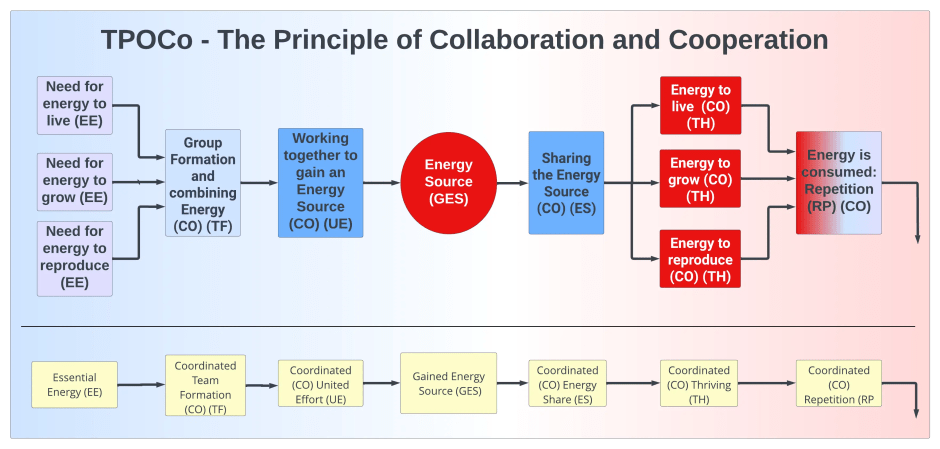Introduction to Coordination for Shared Goals

Visualizing the Balance: Entropy and Coordination in the TPOCo Framework
In the TPOCo framework, coordination is the essential glue that binds cooperation. At its core, coordination ↗ is about managing and optimizing energy. In nature, coordination emerges from the fundamental laws of physics, driving living systems to reduce energy input in their actions to gain the greatest possible energy output. This principle applies universally—from human societies working together down to the cells within every organism.
The goal of coordination is to minimize the energy spent to gain access to energy sources, ensuring that the final energy input benefits the individual, the organism, and even the cellular level. For humans, understanding and leveraging this principle allows society to focus its efforts more efficiently, ensuring that the energy gained through cooperative actions outweighs the energy expended. In TPOCo, coordination is the process through which this energy balance is achieved, aligning actions, reducing waste, and enhancing the collective output.
Trust plays a pivotal role here. When trust exists within a group, friction decreases, and coordination becomes more efficient. This efficiency means less energy is wasted on conflicts or misalignment, allowing more energy to flow to the individuals in the group. The better the coordination, the more energy-efficient the group becomes, ultimately providing greater benefits to every member.
Coordination, then, is not merely a set of rules or standards—it is a reflection of natural processes that aim to maximize energy efficiency. By channeling efforts through trust and reducing unnecessary energy expenditure, coordination serves as the funnel that concentrates the group’s energy towards achieving shared goals and thriving collectively.

The flowchart illustrates how coordination interacts with the other elements of TPOCo, including Team Formation, United Effort, and Trust. By examining these relationships, we see how coordination provides structure, aligns efforts, and reduces chaos, guiding the group efficiently toward its objectives.
Book: “Sync: How Order Emerges from Chaos in the Universe, Nature, and Daily Life” by Steven Strogatz (Amazon ↗)
In “Sync,” Steven Strogatz dives into the fascinating phenomenon of synchronization, where individual parts of a system spontaneously coordinate to create order out of chaos. From the synchronized flashing of fireflies to the rhythmic beating of the human heart, Strogatz illustrates how coordination is a natural process that emerges to reduce disorder and optimize energy use. His exploration extends into human activities, such as social interactions and daily life, demonstrating that sync is a fundamental principle found everywhere in nature.
This book provides a profound insight into how coordination emerges naturally, resonating with TPOCo’s view of cooperation as an energy-driven process. By showcasing examples from physics, biology, and social systems, “Sync” reveals that coordination is not just a human endeavor; it is a universal phenomenon that helps systems operate efficiently. In TPOCo, this mirrors the concept of focusing efforts to maximize the group’s output, whether in nature or society.
“Sync” is an essential read for anyone looking to understand the deeper mechanics behind coordination and how order naturally arises to optimize the flow of energy. It sets the foundation for exploring how TPOCo’s principles of cooperation, trust, and coordination are not isolated ideas but reflections of a broader pattern observed throughout the universe.
Book: “The Systems View of Life: A Unifying Vision” by Fritjof Capra and Pier Luigi Luisi (Amazon ↗)
In “The Systems View of Life,” Fritjof Capra and Pier Luigi Luisi present a holistic framework for understanding life through the lens of systems thinking. The book explores how living systems—from single cells to entire ecosystems—self-organize and coordinate their actions to maintain balance and optimize the flow of energy. This approach aligns closely with TPOCo’s principles, where coordination is seen as a natural response to the need for efficient energy management within cooperative processes.
Capra and Luisi emphasize that life is not merely a collection of isolated parts but a web of interconnected processes, all working together toward the common goal of survival and thriving. This perspective mirrors TPOCo’s idea that coordination within a group, whether in nature or human society, emerges as a way to reduce entropy and focus energy efficiently.
“The Systems View of Life” provides valuable insights into how coordination operates within complex systems, illustrating that cooperation and collaboration are not isolated actions but rather interconnected processes that drive the success of the whole. It is an essential read for anyone seeking to understand the systemic nature of life and how coordinated actions lead to growth, resilience, and thriving.
Book: “The Checklist Manifesto: How to Get Things Right” by Atul Gawande (Amazon ↗)
In “The Checklist Manifesto,” Atul Gawande explores how the simple act of creating and using checklists can dramatically improve coordination in complex environments. By ensuring that standards and procedures are followed consistently, checklists help reduce errors, save time, and conserve energy. Gawande illustrates that coordination is not just about managing tasks but about focusing efforts and aligning actions, which resonates strongly with TPOCo’s principles.
This book provides a practical solution to the challenges of coordination, emphasizing how structure and standards, even in the form of a simple checklist, can build trust within a team. When everyone knows the plan and follows a common guide, the energy input required for decision-making decreases, leaving more resources to focus on achieving shared goals.
“The Checklist Manifesto” is a powerful reminder that effective coordination doesn’t have to be complicated; it can be as straightforward as having a checklist to guide actions, ensuring that group efforts are aligned and energy-efficient. It’s an invaluable resource for understanding how small, structured steps can enhance collaboration, minimize friction, and optimize the group’s overall performance.
Book: “Organizing Genius: The Secrets of Creative Collaboration” by Warren Bennis and Patricia Ward Biederman (Amazon ↗)
In “Organizing Genius,” Warren Bennis and Patricia Ward Biederman explore the dynamics of “Great Groups”—teams that achieved remarkable success through innovative and efficient collaboration. The authors delve into examples like the development of the Apple Macintosh and the Manhattan Project, uncovering how these groups harnessed the power of coordination to focus their collective energy and achieve their ambitious goals.
The book emphasizes that the success of these groups was not due solely to the brilliance of individuals but to the seamless coordination of efforts, roles, and standards. Trust and shared vision were at the core, enabling team members to work in sync and minimize friction. This resonates deeply with TPOCo’s principles, where trust and coordination are key to reducing energy input and maximizing output for every individual in the group.
“Organizing Genius” illustrates that coordination is not a rigid process but a dynamic one that adapts to the team’s needs and goals. By building trust, creating clear roles, and maintaining a shared focus, groups can channel their energy efficiently, leading to extraordinary outcomes. This narrative aligns with TPOCo’s vision of how coordination optimizes collective efforts, making it an insightful read for anyone interested in the mechanics of successful cooperation and collaboration.
Explore the Resources for the Elements of TPOCo
- Youtube Playlists
- Essential Energy (EE)
Understanding the fundamental need for energy among all living beings. - Team Formation (TF)
How groups form with the shared goal of finding or creating a source of energy. - Coordination (CO)
Coordinating efforts within a group to maximize efficiency and reach shared goals. - Division of Labour (SDL)
How tasks are divided among group members to improve energy and skills. - Trust (TR)
The role of trust in helping cooperation and reducing conflict within a group. - United Effort (UE)
How collective efforts are unified to increase success in securing energy. - Gained Energy Source (GES)
Once energy is secured, how it is protected and supported for the group’s long-term survival. - Energy Share (ES)
The process of distributing energy within the group to ensure all members’ needs are met. - Thriving (TH)
How the group’s cooperation leads to thriving, allowing all members to prosper. - Repetition (RP)
The cyclical nature of cooperation ensures survival and success as the process repeats.

